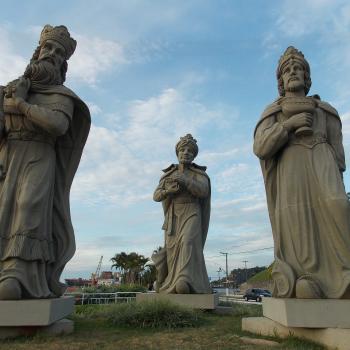It all comes back to Jesus.
All the goodness, all the blessing, all the wonder – it all comes back to Jesus. But so does all the arguing, all the conflict, all the struggle, all the wrestling – it all comes back to Jesus too. He warned us about the sword he was bringing. The good news is sometimes more like a thunderstorm than a gentle rain. He revolutionized our understanding of God, and revolutions are never quiet affairs.
Jesus stands at the center of the maelstrom. He is the eye of the storm. Around him everything is thrown into turmoil, and only by getting closer to him do we find calm. Can all this study of Trinitarian language help us get closer to him?
The essential dilemma of the Nicene fathers, and our central query today, is this: We believe in one God. We also believe that Jesus was sent by God. (All fine and good thus far. We would find a lot of agreement in the world about these statements.) And we believe that God was present in Jesus in an absolutely unique way, present in Person, not just in some kind of anointing or visitation. Not as another god, or godlike avatar, but God himself … who was both here with us, and simultaneously enthroned in heaven. Now how does that work?
In the Nicene era, there were two strategies for working this out. Both groups could be called Trinitarian, but we shall see that they differ in a critical way.
Let’s just tackle one of these strategies today. Anatolios calls these theologians “Trinitarian Theologians of Unity of Will.”
These theologians focused all their attention on the issue of God’s distinctiveness—distinct from everything else that is, because everything else that is, is “contingent.” When we say something is contingent, we mean that it has a dependent existence. It exists only because something caused it to exist. It has no logical necessity. We can imagine it not existing.
And everything, when you think about it, is contingent . . . except God. Everything is optional, not required. God has optioned things into existence, but he didn’t need to. The nebula and the manta ray, the particle and the wave, the cloud and the daisy, your neighbor and yourself—all have existence because something, some processes, persons, choices, has caused them to exist. God, however, is required; he has no cause of existence. By that we mean that the definition of God is Being itself, not derived from anything else. This can be called “unqualified priority.” First. Nothing before.
Our theologians of unity of will examined that characteristic of God and determined that God is utterly other, so much so that as the unbegotten, exalted, transcendent One, he is ultimately incommunicable to our puny minds. Creation cannot survive direct contact with this First One. (Here you can see the confrontation with, and rejection of, those who had argued that creation and God were co-terminous, or both eternal.)
In the effort to keep God at a safe distance from creation, these theologians removed him from contact, and then they had to explain Jesus within the context of creation. Can you see where this leads?
For Arius and his followers, Christ belongs somehow on the creation side of things rather than on the divine side of things, and a great abyss lies between them. Christ becomes the bridge, and is “begotten” for the very purpose of being that bridge. Arius recognizes that scripture gives remarkably divine titles to Christ—Wisdom, Power, Word, Truth, etc.—and therefore there is a divine element to Christ. He comes from God, yes, but he comes from God because God willed him to be “begotten” for the purposes of creating the world and coming into the world.
That last phrase—for the purposes of creating the world and coming into the world—is important. In Latin theological terms, they call this the pro nobis, the “for us” factor. At what point was Jesus given “for us”? Was Jesus given for us in the incarnation? Or was Jesus given for us in his begottenness?
In a very small way, it’s like being a parent. To the small child, the mother exists entirely for the child. That’s the purpose of her being! Duh. And an awful lot of the time, the mother feels the same way (whether she likes it or not). But we know that the mother has an existence of her own, that she has an identity that is fuller and richer than her motherhood. Her motherhood comes out of her deeper person, and is an expression of it, but is not the sum total of who she is.
Think of Jesus as our mother. (Can you?) We understand that our spiritual lives are derived entirely from him. The question is, was Jesus created in order to be that source of life, or was the Son from all eternity an intrinsic expression of the life-giving heart of God?
Arius argued that Christ’s divinity was completely bound to his mediatorial role. Christ was the instrument of the Father’s will in creation and in redemption; he is the created extension of God’s will reaching down into human existence. He packages the transcendence of God in ways that we can manage. Asterius, one of Arius’ followers, put it this way: “[The Son] is Reason (logos) for the sake of rational beings, Wisdom for the sake of those who are made wise, and Power for the sake of those who are empowered.”
These theologians are indeed Trinitarian because they do in fact believe that God is Three Persons. The question is, does Person #1 have an intrinsic (internal) relationship with Person #2 and Person #3, or does Person #1 have an extrinsic (external) relationship with the others?
They would argue that the likeness between the Father and the Son is a likeness of activity, of action, but not of essence. “The Son was generated to be the mediator of God’s gracious purposes in the work of creation and salvation.” Anatolios explains this thinking thus: “The Son has no participation in the divine essence but is entirely the product of the divine will.”
Now, let’s chew on that. What is wrong with this perspective? Arius and his cohorts used scripture to support these ideas: Jesus is the “firstborn of all creation” (Col. 1.15); “God has made this Jesus, whom you crucified, both Lord and Christ” (Acts 2.36). Why did the Nicene fathers ultimately find the “Unity of Will” theological argument inadequate?
Dallas Willard has written this: “The key, then, to loving God is to see Jesus, to hold him before the mind with as much fullness and clarity as possible. It is to adore him.” If Willard is right, then there are some serious problems with Arius. What are they?
Note to Reader: This series on Trinitarian Spirituality explores the history and spirituality behind the shaping of the Nicene Creed using Khaled Anatolios’ Retrieving Nicaea: The Development and Meaning of Trinitarian Doctrine (Grand Rapids, MI: Baker Academic, 2011) as guide and inspiration. It’s best to begin at the beginning: An Introduction.












